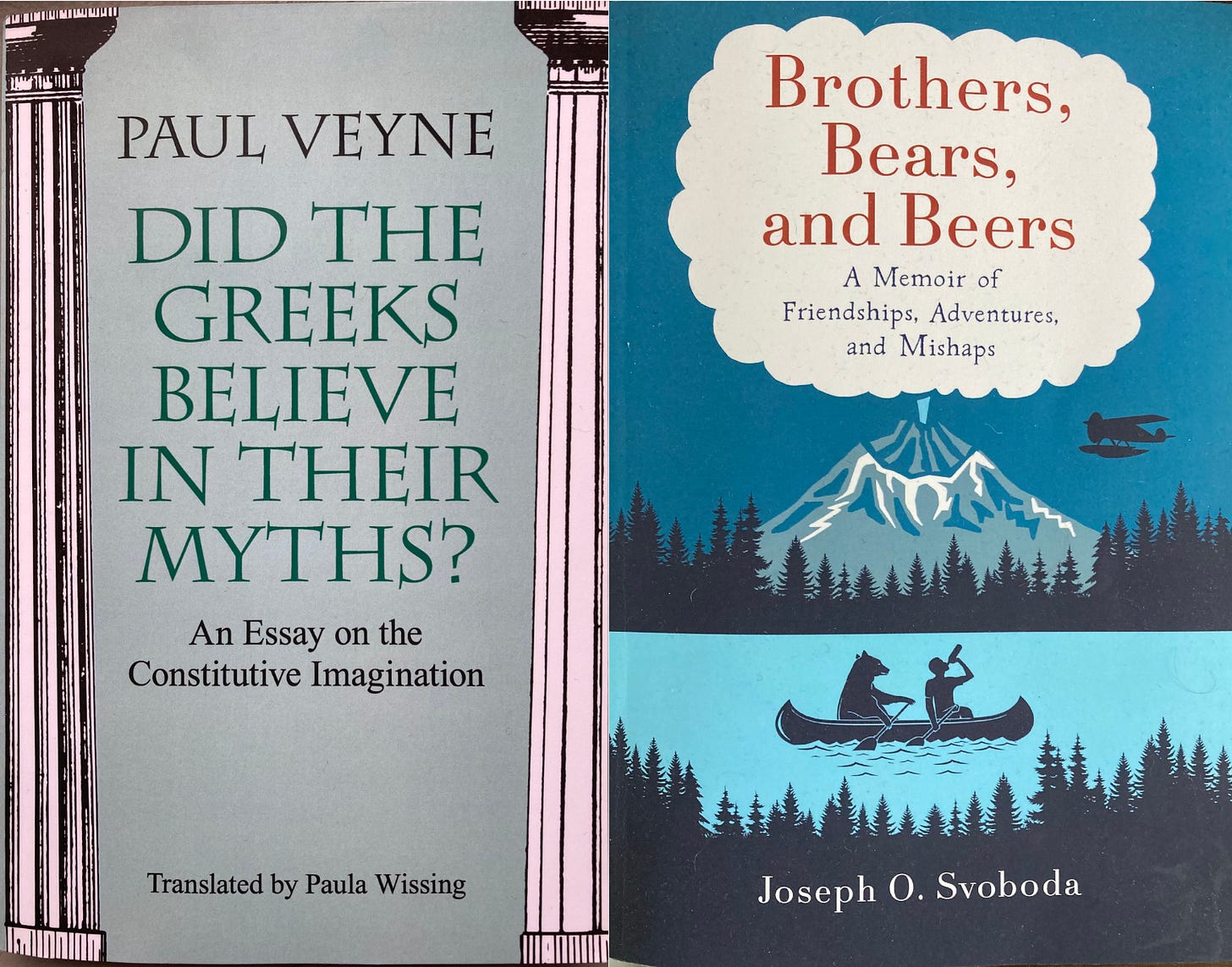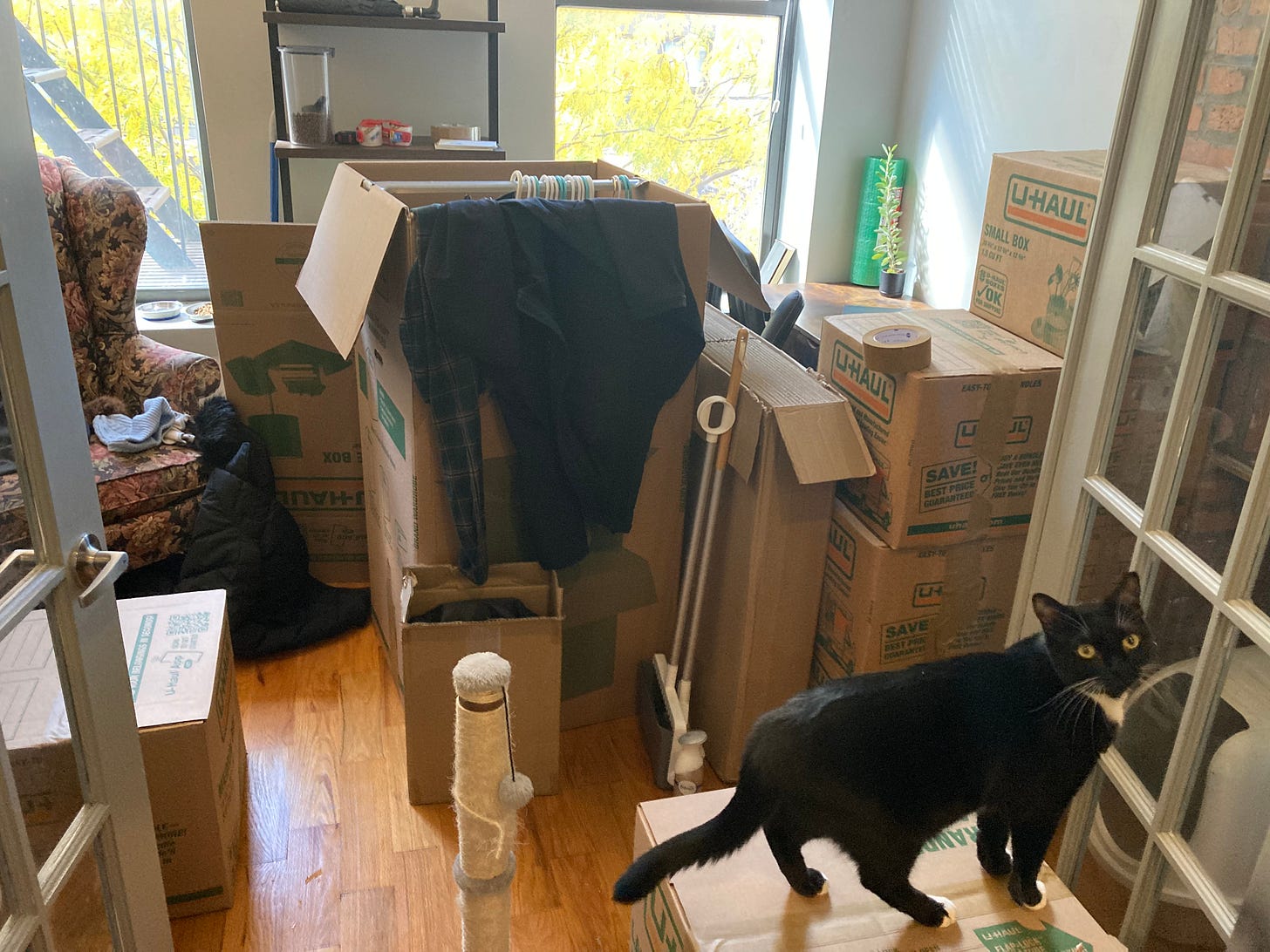We are in the thick of it right now. As I mentioned a couple posts ago, we’re moving back to Santa Fe imminently. The movers will come early next week and we fly out Wednesday. Everything is squared away as much as it can be—the last major piece was finding someone to rent our place so our landlords would let us off the hook for the remainder of our lease and we finally managed it, despite the appalling rent hike they insisted on.
The last two weeks have been a mad scramble to pack up our entire apartment while also keeping it functional and safe for a baby. That plays out as an unending series of picking up some item and calculating, can we pack this or do we still need it? Or alternately Liz saying our nightstand lamp is going to be hard to pack and me replying, “Good, I hate that lamp, let’s leave it behind.” I never felt any way at all about this lamp before now!
Here’s an already outdated picture of what was once my office:
It’s even worse now! As you can imagine, I have not been in a headspace to focus much on reading so the round-up is a little light this month. I am running out of time to get this sent out and the moment I do I’ll pack my laptop so let’s get to the books! Thanks as always to everyone who has subscribed.
I’m always looking for reading recommendations! If you have an idea for something you think I would like or want to see written up here, please drop it in the comments or respond to this email.
Did The Greeks Believe In Their Myths?, Paul Veyne, 1983
Pat Blanchfield cited this during a discussion of the uncanny on Ordinary Unhappiness and the title was such perfect catnip to me that I paused the podcast and ordered it on the spot. Veyne, who died last year at 92, was a French historian of Rome particularly interested in how historians practice sociology and understand the belief structures of past cultures.
In taking up the question in the title, Veyne immediately swerves. There can be no answer to the question, he argues, without wading into the deep waters of what we mean by truth. After all, isn’t that what the question is asking—can’t we reformulate Did the Greeks believe their myths as Did the Greeks hold these stories to be true? This leads to an examination of the imagination and the role it plays in structuring our thoughts. Veyne has something quite specific and perhaps counterintuitive in mind when he uses this term:
This imagination is not the faculty we know psychologically or historically by the same name. It does not, through dream or prophecy, expand the fishbowl in which we live. On the contrary, it creates boundaries. Outside this bowl is nothing, not even future truths. We cannot make them speak. Religions and literatures, as well as politics, modes of conduct, and sciences are formed within these containers. This imagination is a faculty, but in the Kantian sense of the word. It is transcendental; it creates our world instead of providing the leavening or being the demon. However—and this would make an Kantian worthy of the name faint with horror—this transcendence is historical; for cultures succeed one another, and each one is different. Men do not find the truth; they create it, as they create their history.
This is pretty radical! He’s somehow managed to meld Kant with Marx, which I don’t think I’ve encountered before, at least not presented like this. Parts of his theory read like an extreme form of relativism but he’s clear that nothing prevents us from making judgments between good and bad, just that all of those judgments necessarily take place within a “program of truth” that’s historically and socially conditioned.
I must say I found Veyne’s writing is a little frustrating at times. He writes too cleverly in the first half of the book in particular, often failing to state clearly what question is on the table or why he’s telling you the things that he is. He circles this idea of Greek historians attempting to purify their myths of absurd or impossible elements to arrive at the nugget of truth that’s been overgrown by legend for several chapters; whatever modifications he’s making with each reiteration were not clear to me. This improves in the second half, both because the material got less repetitive and because the ideas become abstract enough that he becomes much more forthright about what he’s trying to get at.
Veyne writes aphoristically and can be quite funny. In one section he goes on at great length asking the reader to reimagine cause and effect as an active force “inventing” the effect. Finally at the very end of the discussion he goes, by the way this act of invention is the will to power, not elaborating on that moving on. At another point he presents Heidegger’s differing opinion on the way the constitutive imagination shapes our reality only to witheringly dismiss him, writing, “We suspect that a little historical and sociological criticism is worth more than a lot of ontology.” All in all, very fun, it’s great to get a dose of pure philosophy that was only a 130-page commitment.
Brothers, Bears, and Beers, Joe Svoboda, 2023
My uncle wrote a memoir! Set between 1973 and 1975, he narrates his fraternity years at Monmouth College in Illinois and the increasingly ambitious feats of outdoorsmanship he takes with his frat brothers, culminating in a trip to Alaska that takes up the back half of the book.
The mishaps and misadventures Joe and company blunder through are fun, the kind of story you hear told around a campfire. My uncle ended up becoming a geologist and his reverence for the natural world comes through in his nature descriptions. In one standout chapter, he and his friends take a detour from a rafting trip to explore a cave; he writes with loving detail on the types of stone within and the beautiful, unfathomably slow processes of water and mineral that build stalagmites and stalactites over millennia.
I’m obviously quite critically compromised here but I think my uncle can be proud of what he produced. The stories read quickly and don’t overstay their welcome and provide an authentic window into what life was like for a young person in the 70s. For anyone interested in picking it up, please note that all proceeds are being donated to the Michael J. Fox Foundation for Parkinson’s Research.






